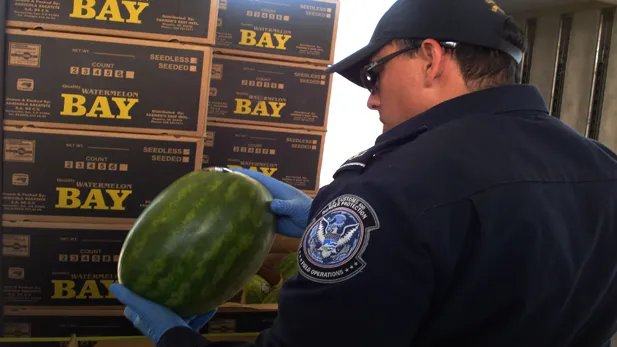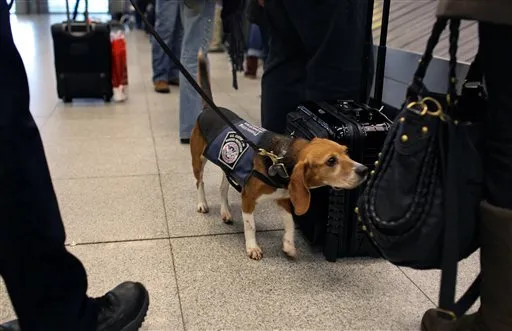Author: Commissioner R. Gil Kerlikowske
It’s a minor annoyance – you arrive in the United States after a trip abroad and a CBP Agriculture Specialist (CBPAS) takes your mangos … or that souvenir straw hat you purchased on spring break recently… or the special foods that remind you of your homeland.

watermelon inspections at a CBP port
of entry.
As Commissioner, I want to assure you that there are good reasons for this: CBP is responsible for protecting American agriculture and the nation’s economy by ensuring the interception of foreign plant pests, diseases, and by detecting and preventing agro-terrorism and bio-terrorism.
That straw hat or those mangos might be harboring a hitchhiking pest that could damage U.S. crops. Invasive species have caused $138 billion annually in economic and environmental losses in the United States, including yield and quality losses for America’s agriculture industry. Additionally, plant pests and foreign animal diseases could threaten our farm animals and wildlife.
Most travelers are simply unaware of the rules. But you’d be astonished at the lengths to which some people will go to hide prohibited items being brought into this country. We’ve found sausages hidden in tires, live birds under clothing worn by air passengers, and packets of seeds tucked into books.
Every day, CBPAS help prevent the intentional and unintentional introduction of potentially harmful plant pests and foreign animal diseases from entering the United States at more than 300 ports of entry. Sometimes a pest will arrive in cargo. For example, recently CBPAS at Washington Dulles International Airport found a snail on an air shipment of flowers from Europe. This type of snail had never been seen before in the United States.

nose is highly sensitive to food odors,
sniffs incoming baggage and passengers
at John F. Kennedy Airport.
But we don’t do it alone. CBP collaborates closely with other agencies to protect America’s agriculture. The success of the Agriculture Quarantine Inspection program in preventing the entry of pests and diseases is a result of the cooperation between CBP and the U.S. Department of Agriculture’s Animal and Plant Health Inspection Service (APHIS).
APHIS establishes the risk and rules that govern the importation of agricultural products, and CBP is responsible for conducting the actual inspections at ports.
CBP also intercepts endangered species and turns them over to U.S. Fish and Wildlife Services – like the time CBPAS in Houston found 55 dead seahorses hidden in a soft drink bottle in luggage carried by a traveler arriving from Asia.
You can help, too. CBP has lots of information on our website about our important agriculture mission. As the summer travel season approaches, make sure you know what’s permissible to bring back before you leave. You’ll have a happier homecoming.

